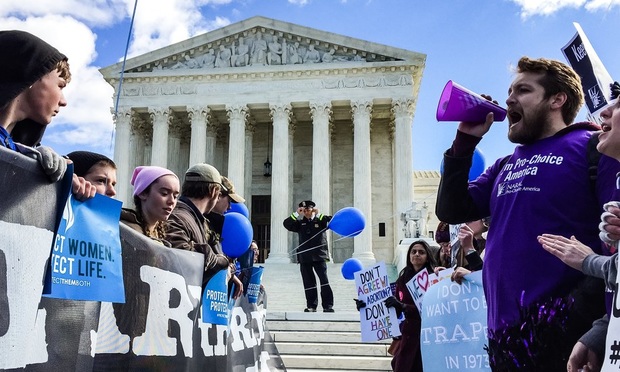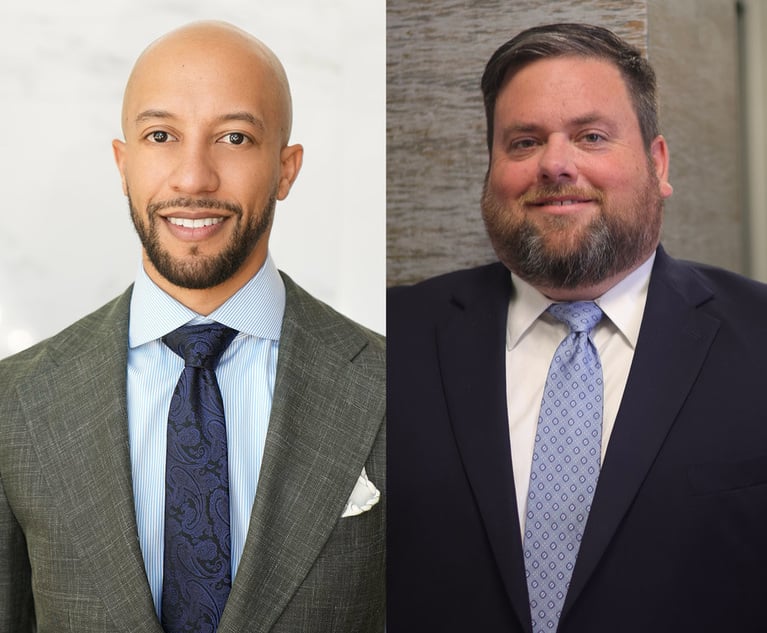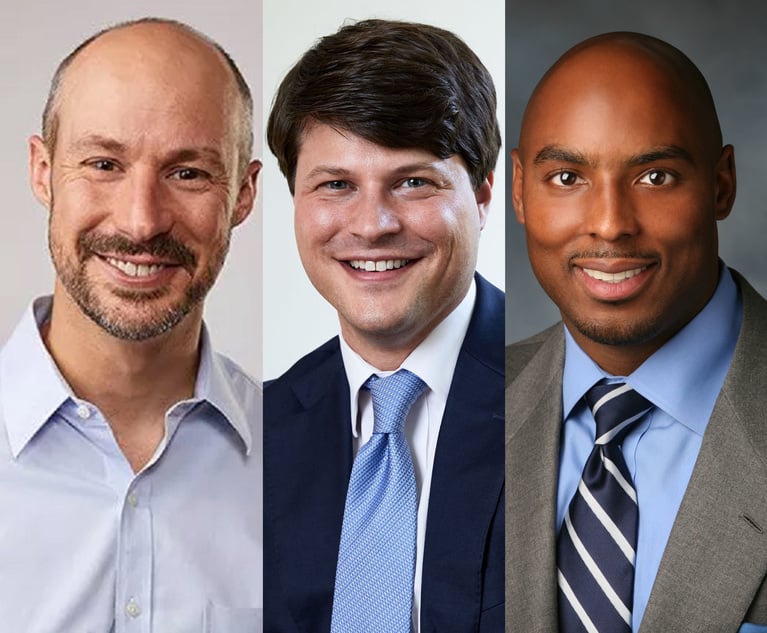If 'Roe v. Wade' Is Overturned, What Happens in Georgia?
An abortion case in the Georgia Supreme Court could test its 113-year-old decision finding a right of privacy in the state constitution against the state's "textualist" Supreme Court.
August 09, 2018 at 05:57 PM
8 minute read
 Protesters for and against abortion rights rally outside the U.S. Supreme Court in March 2016. (Photo: Diego M. Radzinschi/ALM)
Protesters for and against abortion rights rally outside the U.S. Supreme Court in March 2016. (Photo: Diego M. Radzinschi/ALM)
Beyond a mountain of “ifs” lies a potential Georgia Supreme Court clash of abortion, privacy, precedent and conservative judicial principles.
The “ifs” start with abortion rights advocates, who openly fear that, if Judge Brett Kavanaugh is confirmed to the U.S. Supreme Court, he will tilt it to overrule Roe v. Wade. That's the 1973 decision holding that states largely may not interfere with a woman who wishes to terminate her pregnancy.
The end of Roe would mean the question of abortion legality returns to individual states—and most likely their high courts.
A case in the Georgia Supreme Court could test its 113-year-old decision finding a right of privacy in the state constitution, considered the first of its kind in the country. The decision was key to the court striking down the state's law criminalizing sodomy in 1998.
The state high court's current justices, most of whom were appointed by Republican governors in the past 13 years, have adopted an approach spearheaded by the late U.S. Supreme Court Justice Antonin Scalia. The court declared in a decision last year, “we must construe a constitutional provision consistent with the meaning of its text at the time it was adopted.” That same “textualist” philosophy can be highly skeptical of rights that judges have discovered in constitutions that were not mentioned specifically in those documents.
The 1905 ruling establishing a right of privacy in Georgia, Pavesich v. New England Life Insurance Co., stemmed from a man suing the insurer because it used a photograph of him in an advertisement that purported to show him as a satisfied customer.
Justice Andrew J. Cobb wrote: “It is to be conceded that prior to 1890 every adjudicated case, both in this country and in England, which might be said to have involved a right of privacy, was not based upon the existence of such right, but was founded upon a supposed right of property, or a breach of trust or confidence, or the like.”
“In such a case although there be no precedent,” Cobb continued, “the common law will judge according to the law of nature and the public good.”
Confronted with that language, “I suspect the textualists would hit the roof,” said John Amabile, a business litigator at Parker Poe who has written about trends at the current state court.
In a purely textualist view, he added, the right of privacy under the Georgia constitution “probably goes away.”
But Amabile cautioned that an abortion rights case “is very unlikely to be reduced to a textualist approach.”
“I suspect the court won't do that,” assuming courts try not to upend case law, Amabile said.
Civil rights lawyer Gerry Weber, the former legal director of Georgia's American Civil Liberties Union, said the right to privacy is grounded in the state's guarantee against depriving a person of liberty without due process of law—a point the Pavesich court explained.
Significantly, he argued, subsequent decisions have said the right to privacy—and bodily autonomy—prevail over ”a compelling government interest in preserving human life” in cases over a quadriplegic seeking removal of a respirator and a state prisoner on a hunger strike.
“It's one thing to overrule a precedent,” said Weber. “It's another thing for a state Supreme Court to revisit 113 years of case law.”
Considering the portraits of historic justices on the walls of the state Supreme Court, Weber added that, to overrule Pavesich, “You'd have to put Xs over half their faces.”
Weber concluded that, compared with other states, some of which followed Georgia's lead in declaring a right to privacy under their constitution's due process clauses, “I think Georgia has a stronger argument” to preserve abortion rights “if this set of dominoes fell.”
Josh Belinfante of the Robbins Firm, who was the top lawyer to Republican Gov. Sonny Perdue, noted the Pavesich ruling “is indicative of a judicial analysis that is not in favor.”
The lack of a textual privacy right “would certainly be a factor, but it's not determinative” in an abortion case, he said.
Belinfante said he's seen the current state high court adopt prior precedent in cases where the textual basis of a rule was questionable.
“They take each case as it comes,” Belinfante added.
The court could come to the same conclusion as Pavesich but use different reasoning, Belinfante said. Or it could find a privacy right but allow legislation that would make abortion more difficult to obtain.
Leah Ward Sears, who served on the state Supreme Court for 17 years, including four as chief justice, said she considers Georgia's privacy right more powerful than the one under the U.S. Constitution. She embraced Pavesich's privacy right in the sodomy decision in 1998.
Today's court, she said, “may very well be different.”
“They could get there if they wanted to,” Sears said, referring to a decision allowing the state to ban abortion. However, there are many factors beyond textualism that could go into a decision, such as stare decisis and stability, she said.
For similar reasons, Sears—now a partner at Smith, Gambrell & Russell—said she does not expect the U.S. Supreme Court to overturn Roe v. Wade.
“Miranda still lives,” she said, referring to the 1966 Miranda v. Arizona decision finding that criminal suspects must be warned that their statements could be used against them. That decision was frequently criticized by conservatives but then upheld in 2000 in a decision by Chief Justice William Rehnquist.
Laura Simmons, the director of NARAL Pro-Choice Georgia, isn't comfortable with predictions that Roe could be upheld or that the state high court would keep abortion legal. Speaking of the privacy decision, she said, “We don't have any assurances that it'd be upheld. The court is just not the court we had in 1998″ when Pavesich led the way to the striking down the sodomy laws.
“We feel our rights are under attack,” she added, noting the group's support of Stacey Abrams, the Democratic candidate for governor. Simmons called Abrams “a true champion for reproductive freedom” who would be able to veto any abortion ban passed by the General Assembly.
The Republican candidate, Secretary of State Brian Kemp, said on Facebook during the primary race, “I back Mississippi's ban on abortions after fifteen weeks and vow to sign the toughest abortion laws in the country as your next governor. If abortion rights activists want to sue me … bring it!”
Shannon Vogt, vice president of Georgia Right to Life, said her group would “welcome the change” if Roe v. Wade were overruled, but she said she could not speculate on what would happen in Georgia.
Attorney General Chris Carr, a Republican, had no comment on Roe being overturned and how he'd respond to a law banning abortions. Last year, his office defended a 2012 law banning abortions at 20 weeks before the state high court. The brief he and his staff submitted argued that the Georgia Constitution “contains no direct language regarding privacy.”
Moreover, Carr and his staff argued in the headline to one section of their brief, “The Constitution Itself Does Not Provide a Remedy for a Violation of the Right to Privacy.”
In a decision some considered highly textualist, the court ruled that the doctors' lawsuit against state officials over that 2012 law had to be dismissed because the officials enjoyed sovereign immunity from this type of suit. Weber, the civil rights lawyer, said that decision would not preclude a suit over the constitutionality of a post-Roe abortion ban.
Charlie Bailey, the Democratic candidate for attorney general, said if Roe were overturned, he'd urge the governor and General Assembly not to curtail a woman's right “to make her own healthcare decisions.”
If an abortion ban went to the state Supreme Court, Bailey said he'd ”closely examine whether such legislation oversteps the new boundaries drawn by the U.S. Supreme Court, and if I believe they do, I will take action as attorney general to see that such legislation is struck down by the appropriate court.”
This content has been archived. It is available through our partners, LexisNexis® and Bloomberg Law.
To view this content, please continue to their sites.
Not a Lexis Subscriber?
Subscribe Now
Not a Bloomberg Law Subscriber?
Subscribe Now
NOT FOR REPRINT
© 2025 ALM Global, LLC, All Rights Reserved. Request academic re-use from www.copyright.com. All other uses, submit a request to [email protected]. For more information visit Asset & Logo Licensing.
You Might Like
View All
Trial Court Had No Authority to Reopen Voir Dire After Jury Impaneled in Civil Case, State Appellate Court Rules

'Pushed Into Oncoming Traffic': $5.85M Settlement in Mediated Auto Tort
6 minute read
Justice Known for Asking 'Tough Questions' Resolves to Improve Civility
4 minute read
Trending Stories
- 1'A Death Sentence for TikTok'?: Litigators and Experts Weigh Impact of Potential Ban on Creators and Data Privacy
- 2Bribery Case Against Former Lt. Gov. Brian Benjamin Is Dropped
- 3‘Extremely Disturbing’: AI Firms Face Class Action by ‘Taskers’ Exposed to Traumatic Content
- 4State Appeals Court Revives BraunHagey Lawsuit Alleging $4.2M Unlawful Wire to China
- 5Invoking Trump, AG Bonta Reminds Lawyers of Duties to Noncitizens in Plea Dealing
Who Got The Work
J. Brugh Lower of Gibbons has entered an appearance for industrial equipment supplier Devco Corporation in a pending trademark infringement lawsuit. The suit, accusing the defendant of selling knock-off Graco products, was filed Dec. 18 in New Jersey District Court by Rivkin Radler on behalf of Graco Inc. and Graco Minnesota. The case, assigned to U.S. District Judge Zahid N. Quraishi, is 3:24-cv-11294, Graco Inc. et al v. Devco Corporation.
Who Got The Work
Rebecca Maller-Stein and Kent A. Yalowitz of Arnold & Porter Kaye Scholer have entered their appearances for Hanaco Venture Capital and its executives, Lior Prosor and David Frankel, in a pending securities lawsuit. The action, filed on Dec. 24 in New York Southern District Court by Zell, Aron & Co. on behalf of Goldeneye Advisors, accuses the defendants of negligently and fraudulently managing the plaintiff's $1 million investment. The case, assigned to U.S. District Judge Vernon S. Broderick, is 1:24-cv-09918, Goldeneye Advisors, LLC v. Hanaco Venture Capital, Ltd. et al.
Who Got The Work
Attorneys from A&O Shearman has stepped in as defense counsel for Toronto-Dominion Bank and other defendants in a pending securities class action. The suit, filed Dec. 11 in New York Southern District Court by Bleichmar Fonti & Auld, accuses the defendants of concealing the bank's 'pervasive' deficiencies in regards to its compliance with the Bank Secrecy Act and the quality of its anti-money laundering controls. The case, assigned to U.S. District Judge Arun Subramanian, is 1:24-cv-09445, Gonzalez v. The Toronto-Dominion Bank et al.
Who Got The Work
Crown Castle International, a Pennsylvania company providing shared communications infrastructure, has turned to Luke D. Wolf of Gordon Rees Scully Mansukhani to fend off a pending breach-of-contract lawsuit. The court action, filed Nov. 25 in Michigan Eastern District Court by Hooper Hathaway PC on behalf of The Town Residences LLC, accuses Crown Castle of failing to transfer approximately $30,000 in utility payments from T-Mobile in breach of a roof-top lease and assignment agreement. The case, assigned to U.S. District Judge Susan K. Declercq, is 2:24-cv-13131, The Town Residences LLC v. T-Mobile US, Inc. et al.
Who Got The Work
Wilfred P. Coronato and Daniel M. Schwartz of McCarter & English have stepped in as defense counsel to Electrolux Home Products Inc. in a pending product liability lawsuit. The court action, filed Nov. 26 in New York Eastern District Court by Poulos Lopiccolo PC and Nagel Rice LLP on behalf of David Stern, alleges that the defendant's refrigerators’ drawers and shelving repeatedly break and fall apart within months after purchase. The case, assigned to U.S. District Judge Joan M. Azrack, is 2:24-cv-08204, Stern v. Electrolux Home Products, Inc.
Featured Firms
Law Offices of Gary Martin Hays & Associates, P.C.
(470) 294-1674
Law Offices of Mark E. Salomone
(857) 444-6468
Smith & Hassler
(713) 739-1250






